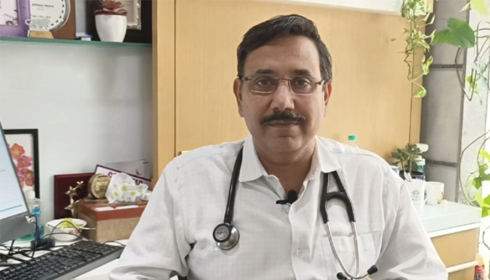
Hypertension Awareness: Expert Highlights Silent but Pervasive Health Threat
Dr. Ashwani Mehta, Senior Consultant in Cardiology at Sir Ganga Ram Hospital, has issued a stark warning about the dangers of hypertension, describing it as a "silent killer." In an interview, Dr. Mehta emphasized the high prevalence of hypertension in India, noting its particularly alarming rates in both urban and rural areas.
Dr. Ashwani Mehta, Senior Consultant in Cardiology at Sir Ganga Ram Hospital, has issued a stark warning about the dangers of hypertension, describing it as a "silent killer." In an interview, Dr. Mehta emphasized the high prevalence of hypertension in India, noting its particularly alarming rates in both urban and rural areas.
"In urban areas, the incidence of hypertension is around 25%, while in rural regions, it's about 12-15%," Dr. Mehta stated. He highlighted that approximately 33% of Indians are in a prehypertension stage, with systolic readings between 120 and 130 and diastolic readings from 80 to 90. Overall, about 50% of Indians suffer from either prehypertension or hypertension.
Dr. Mehta stressed the importance of taking hypertension seriously due to its potential to cause severe health issues if left unmanaged. "If we do not monitor our blood pressure and fail to take prescribed medications, we risk brain strokes, heart attacks, heart failure, and kidney failure," he warned.
He explained that the prehypertension stage is a critical period before the onset of full-blown hypertension. Current guidelines suggest that a blood pressure reading of 140/90 mm Hg or higher constitutes hypertension. The prehypertension stage serves as a warning to modify one's lifestyle, including reducing salt intake, increasing physical activity, avoiding smoking and alcohol, and managing stress.
Dr. Mehta advised that individuals with blood pressure readings above 120/80 mm Hg should consider lifestyle changes, and those with readings above 140/90 mm Hg should start taking medication. He acknowledged that many people are hesitant to start hypertension medications due to the lifelong commitment they often entail.
"There is no study confirming that hypertension medications must be taken for life," Dr. Mehta said. "However, hypertension is a chronic condition that tends to increase with age. Maintaining a good lifestyle can help manage blood pressure, but medications are necessary for many individuals to keep it under control."
Dr. Mehta's insights underscore the critical need for awareness and proactive management of hypertension to prevent serious health complications.